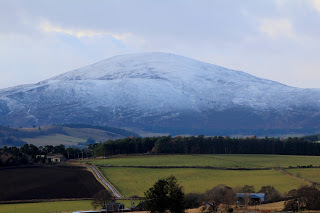A quiet day.
 I potter about, doing errands. The funny thing is that even if you do not do Christmas there still are things to do. I find myself making lists and delivering things and doing a lot of cooking.
I potter about, doing errands. The funny thing is that even if you do not do Christmas there still are things to do. I find myself making lists and delivering things and doing a lot of cooking.As I do the cooking, I listen to the wireless. Mark Mardell has devoted the whole of The World At One to Syria. He has three experts in their field to talk about it. They are serious and engaged and articulate. They use their brains to combat despair. But I can hear, under their fluent voices, the rumble of exhaustion and fury. ‘How could we let this happen?’ says one of them. ‘On our watch. It is on our generation’s watch.’ As if in some way an entire cohort is responsible, by default, by neglect, by simple confusion or inertia or the awful tangle of what is politically possible, and perhaps it is.
Then a rather extraordinary thing happens. Mardell mentions that people have compared the situation to the Thirty Years’ War. Andrew Mitchell, his political guest, at once takes up the baton, as if this were the very analogy for which he had been searching. He begins talking of the Peace of Westphalia in 1648.
I stare in amazement. I read history at university, but I could not begin to tell you about the Peace of Westphalia, nor could I have given you a date for it. How many politicians, I wonder, would know that? How many educated people would know that? I feel oddly proud, in a completely irrational way, that there are backbenchers in the House of Commons who know about the Peace of Westphalia and the great powers who signed it and when it happened. Good old Blighty, I think; someone, somewhere is still teaching the history.
And then the programme finishes and another one starts. It is a programme about secrecy. A cross-dresser comes on. He has to keep his predilection a secret from his family. He sounds very weary, as if this secrecy rubs and presses on him, never letting him go. I think of the drag queens I used to run around with in Soho when I was in my twenties. They were so totally without secrecy, so vivid and proud and witty. They used to give me lipstick tips in the lav. I looked up to them, literally because they were all immensely tall and they wore six inch heels, and figuratively too. I was not at all sure who I was in those days, but they seemed to know exactly who they were and what they wanted and they strode out on those antic streets in search of it.
Storm Barbara huff and puffs. She keeps pitching up, in a livid rage, and then she gets bored or spots something else more interesting and goes away again. I start to think we won’t have a power cut after all.
Everything is very quiet now, as the wind dies down. I miss my mother. It is my second Christmas without her and I miss her. I fold the missing into my heart as if I am putting a note away in a careful, precious place. I had been running away from the sorrow, I realise. I got a little cocky. I had come back to usual life, was able to laugh with conviction and think of happy things and feel enjoyment running through me like electricity. That’s it, I thought; that race is run. But of course it does not quite work like that. Grief does not go. It becomes rarer, its visits more spaced out, its knocks on the door less frequent. It loses its daily weight, and stops making the head hurt. But at certain times, for a reason or for no reason, it pays its visit, and you can’t slam the door in its face. You have to let it in and give it a nice glass of Fino and let it say all the things it wants to say and then kindly smile and wave it goodbye until the next time.
In the quiet, the Beloved Cousin rings. ‘I am reading your book,’ she says, her voice carrying strongly down the line, full of life and interest and humour. ‘I’m absolutely loving it. And you know it is really helpful. N keeps saying: what does she say next?’ N is the smallest cousin, who is now eight. I think the fact that she wants to know what I say next is one of the best compliments I ever had. I smile all over my face.
Published on December 23, 2016 07:49
No comments have been added yet.



